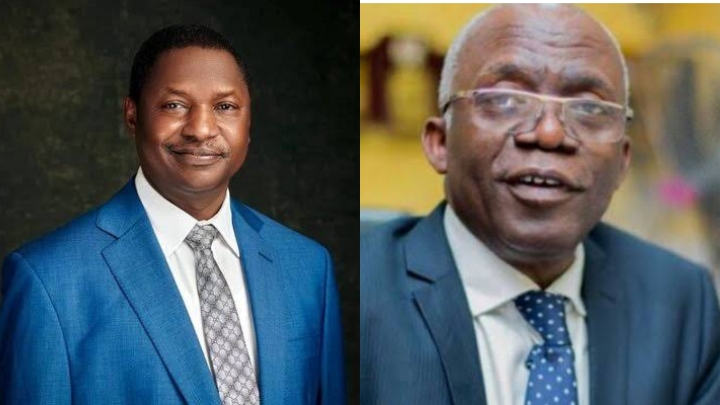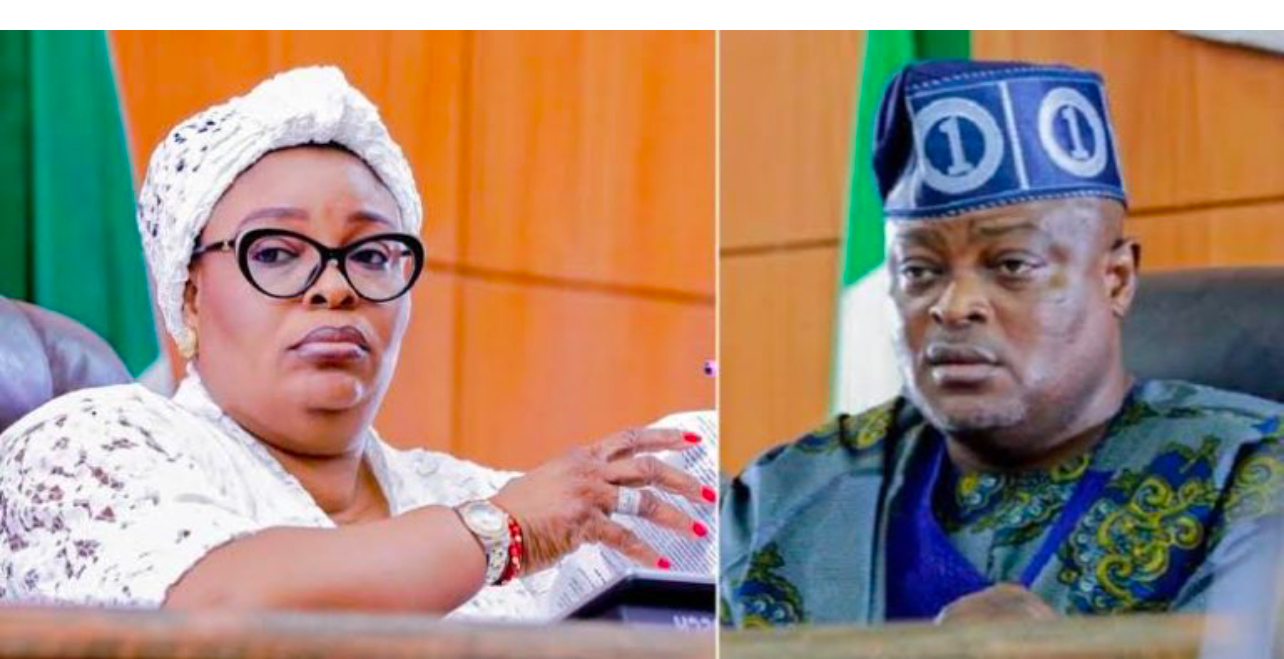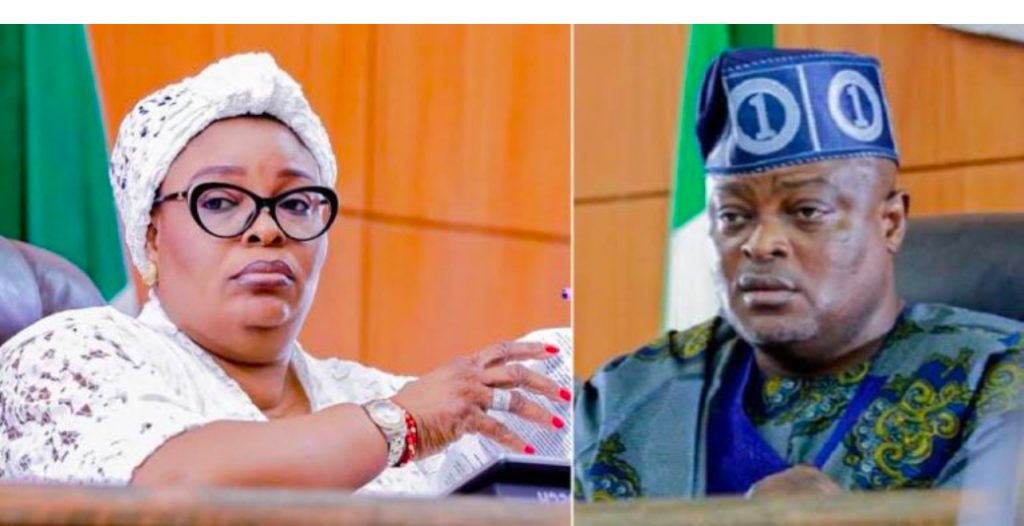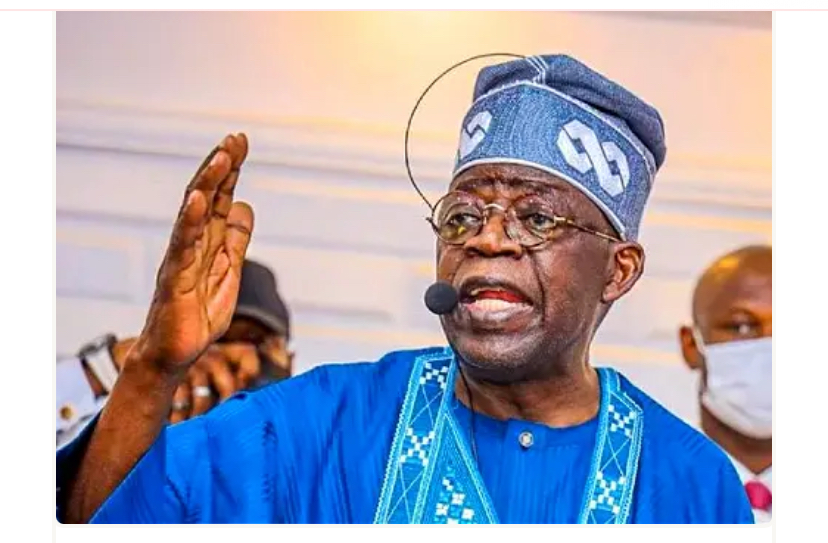Uncategorized
Update: 2023 Ambitious, AGF, Malami, manipulating the Federal High Court, Says Femi Falana

 Mr Falana said the AGF, despite being a defendant in all the cases, did not draw the attention of both Ibadan and Umuahia divisions of the Federal High Court to the Abuja division’s restraining order concerning section 84(12) of the Electoral Act.
Mr Falana said the AGF, despite being a defendant in all the cases, did not draw the attention of both Ibadan and Umuahia divisions of the Federal High Court to the Abuja division’s restraining order concerning section 84(12) of the Electoral Act.
ByAmeh Ejekwonyilo March 27, 2022 6 min read
Human rights lawyer, Femi Falana, on Sunday, accused the Attorney General of the Federation and Minister of Justice, Abubakar Malami, of manipulating the Federal High Court into issuing conflicting decisions on section 84(12) of the new Electoral Act 2022.
Mr Falana said Mr Malami pretended not to be aware of the restraining order of the Federal High Court in Abuja barring him and others from tampering with the legal provision but vowed to implement that of the Umuahia division of the court which ordered the deletion of the clause from the law.
The Senior Advocate of Nigeria, in a statement providing some details of the decisions of three divisions of the Federal High Court on the matter, blamed Mr Malami for allegedly manipulating the court into issuing the conflicting orders. He said Mr Malami, cannot, therefore, pick and choose which of the orders to obey or disobey.
“It is trite that the Attorney-General cannot choose and pick the orders of the court to obey or disobey.
“More so, when it is undoubtedly clear that the Attorney-General deliberately set out to manipulate the Federal High Court to issue conflicting orders in a desperate move to annul section 84(12) of the Electoral Act,” Mr Falana said.
The division of the federal court in Umuahia, Abia State, had on March 18, nullified Section 84(12) of the Electoral Act — a decision that sits well with President Muhammadu Buhari’s earlier protest against the controversial legal provision.
The novel statutory provision had prohibited political appointees from voting as delegates in party conventions or congresses for the election or nomination of candidates.
In her verdict, the judge, Evelyn Anyadike, held that the section was “unconstitutional, invalid, illegal, null, void and of no effect whatsoever” and ordered the AGF who was the sole defendant in the suit, to “forthwith delete the said Subsection 12 of Section 84 from the body of the Electoral Act, 2022.”
She anchored her decision on the grounds that the provision conflicted with the constitutional provision that already gives political appointees who intend to contest in an election to resign at least 30 days to the election.
Many lawyers have faulted this reasoning, arguing that political appointees are not part of the category of persons required by the constitution to resign at least 30 days to the election.
Mr Malami was picked as the sole defendant in the suit filed by Nduka Edede, a member of the Action Alliance (AA), a fringe political party in Nigeria.
The AGF has shown extra-ordinary interest in ensuring the striking down of the section 84(12) of the Electoral Act, which would have forced him out of office early to realise what is believed to be his ambition to contest the 2023 governorship election in Kebbi State, his home state.
‘Malami engaged in forum shopping’
But chronicling two previous rulings of the Federal High Court in Abuja and Ibadan, Oyo State, on the same matter, Mr Falana, a Senior Advocate of Nigeria (SAN), said Mr Malami desecrated the office of the AGF by engaging in “forum shopping” to get a favourable verdict.
“No doubt, this is the first time in the entire history of Nigeria that the office of the Attorney-General of the Federation has engaged in forum shopping for favourable orders of the Federal High Court or any other court. It is high time the dangerous manipulation of the Federal High Court was stopped as the nation prepares for the 2023 General Elections,” a statement issued on Sunday by Mr Falana.
The human rights lawyer pointed out that while the Abuja court barred Mr Buhari, the AGF and the National Assembly from tampering with the newly amended Electoral Act, the Ibadan division of the federal court declined jurisdiction on the matter.
On March 8, 2022, Inyang Ekwo, the judge, had in a ruling on an ex parte application by the opposition Peoples Democratic Party (PDP), held that the amended Electoral Act, having become a valid law, must not be unduly tampered with.
Specifically, the court restrained President Buhari, the AGF and the National Assembly and other defendants in the suit from removing section 84 (12) of the Electoral Act or prevent it from being implemented for the purpose of the 2023 general elections.
However, when the suit with the same issues arose in Umuahia, Mr Falana lamented the AGF who was the sole defendant in the case, refused to draw Mrs Anyadike’s attention to the two preceding rulings of her colleagues in Abuja and Umuahia.
Mr Falana listed the other suits in which the two preceding rulings had been delivered to include one filed in Abuja with suit number, FHC/ABJ/CS/247/2002 (PDP versus President, Federal Republic of Nigeria & 8 others).
The other, he said, was filed in Ibadan, Oyo State, with suit number, FHC/IB/CS/32/2022 (Chief Oyewole Bolanle versus Attorney-General of the Federation).
“From the foregoing, it is crystal clear that even though the two lawyers who represented the Plaintiffs in Suit Nos FHC/IB/CS/32/2022: CHIEF OYEWOLE BOLANLE v ATTORNEY-GENERAL OF THE FEDERATION and FHC/UM/CS/26/2002: CHIEF NDUKA EDEDE v ATTORNEY-GENERAL OF THE FEDERATION are based in Ibadan, Oyo State and Umuahia, Abia State, the two cases filed by them were similar in every material particular.
“Hence, the two questions formulated for determination and the four similar reliefs sought by their clients in the two cases filed at the Ibadan and Umuahia judicial divisions of the Federal High Court are in pari material.
“Even though the plaintiffs are different the Attorney-General of the Federation is the sole defendant in both cases. It is doubtful if the similarities in the two cases can be said to be mere coincidence,” Mr Falana said.
The senior lawyer said the AGF, despite being a defendant in all the cases, did not draw the attention of both Ibadan and Umuahia divisions of the Federal High Court to the Abuja division’s restraining order.
“Neither did the Attorney-General disclose to the Umuahia judicial division of the Federal High Court that the Ibadan judicial division had struck out a similar case for want of locus standi,” he added.
He also said the judge in the Umuahia division “ought to have struck out the fresh case before her as it constituted a gross abuse of court process” given that the case pending at the Ibadan judicial division of the court “was well reported in the print and electronic media”.
This, again, highlights the perennial issues of conflicting court orders emanating from the Nigerian courts of coordinate jurisdiction, a matter that the National Judicial Council (NJC) recently sanctioned some judges for.
‘Why Umuahia judgement can’t be enforced’
Hours after the court in Umuahia handed down its verdict, Mr Malami issued a celebratory statement vowing to implement Mrs Anyadike’s orders by deleting the legal provision which he described as “offensive” from the law.
Mr Falana further queried Mr Malami’s speed in enforcing the latest ruling while pretending not to be aware of the earlier restraining order issued against him and others over the same issue.
“It is pertinent to note that while the Attorney-General of the Federation pretended not to know about the order of interim injunction granted by the Abuja Judicial Division of the Federal High Court, he has announced the plan of the Federal Government to comply with the judgment delivered in the Umuahia case as soon as possible
“However, the Attorney-General of the Federation (Malami), the Defendant in both cases did not draw the attention of both Ibadan and Umuahia Judicial Divisions of the Federal High Court to the fact that the Abuja Judicial Division of the same Court had, on March 7, 2022, restrained himself, President Buhari, National Assembly and the Independent National Electoral Commission from refusing to implement the provisions of Section 84(12) of the Electoral Act, 2022,” the lawyer noted.
Should Mr Malami go ahead to delete the provision as he vowed to do, Mr Falana said the AGF risks facing the consequence of contempt of court.
“However, if the Attorney-General goes ahead to delete section 84(12) of the Electoral Act he would be liable to be committed for contempt ex facie curiae as the Abuja Judicial Division of the Federal High Court has restrained him and other defendants from ‘from enforcing the provisions of the said Electoral Act, 2022 including the provisions of Section 84(12) of the said Act pending the determination of the motion on notice for an interlocutory injunction’,” Mr Falana said.
He added: “We submit, without any fear of contradiction, that unless the valid and subsisting order of the Abuja Judicial Division of the Federal High Court is set aside either by the trial Judge or an Appellate Court the Attorney-General of the Federation cannot DELETE section 84(12) of the Electoral Act.”
Malami denies Falana’s allegation
Mr Malami on Sunday denied Mr Falana’s allegation when contacted by our reporter on Sunday, insisting that his actions are all in compliance with the law.
“It only takes the figment of the imagination of mischief makers to think or assume that the Attorney General of the Federation and Minister of Justice will stoop so low to do what they claimed,” a statement by Umar Gwandu, the AGF’s spokesperson, read in part.
While pledging Mr Malami’s “commitment to ensuring justice, equity, fair play” in the discharge of his responsibilities, Mr Gwandu said the AGF “was made a defendant in the case” concerning the new Electoral Act.”
He advised Nigerians “to refrain from making ‘unsubstantiably’ fabricated conjectures targeted at mischievously casting aspersions on personalities to score ulterior motives.”
“The Attorney General of the Federation is a strong advocate of equality before the law and non-discriminatory universal application of laws that do not disenfranchise citizens and not contradict the provisions of the Constitution and the extant laws,” the statement added.
Mr Malami had, at other time, insisted that his position on the controversial legal provision was in defence of constitutionalism and protection of the constitutional rights of every Nigerian to vote and be voted for in elections.
politics
Update : Lagos Crisis: Details on how DSS interfered in legislative affairs in LSHA, says Hon. Ogundipe.

 Our attention has been drawn to a publication by the Department of State Security (DSS) regarding a letter dated 14th February 2025,
Our attention has been drawn to a publication by the Department of State Security (DSS) regarding a letter dated 14th February 2025,
“Enhanced Security Measures for LSHA,”
Earlier today, lawmakers and staff of the Lagos State House of Assembly arrived at the Assembly complex to find the offices of the Speaker, the Deputy Speaker, and the Acting Clerk of the House locked and access restricted by operatives of the DSS. Furthermore, the legislative chamber itself was sealed off.
In an apparent effort to justify their actions, the DSS released to the public a letter written by the Acting Clerk of the House, requesting security presence at the Assembly complex.
We wish to categorically state that this is not the first time the House has sought security support from the DSS.
However, it is important to emphasize that in all previous instances, DSS operatives have been stationed at the main gate of the Assembly complex, ensuring that unauthorized persons do not gain entry.
For the avoidance of doubt, at no point did the letter requesting security assistance instruct the DSS to:
– Invade the legislative chamber
– Lock and restrict access to the Speaker’s office
– Lock the office of the Acting Clerk
– Lock the Deputy Speaker’s office
The events of today raise serious concerns about undue interference in legislative affairs. The sanctity of the Lagos State House of Assembly was undermined by armed DSS operatives who actively obstructed lawmakers from performing their constitutional duties.
This act amounts to an infringement on the independence of the legislature and a direct assault on democratic governance.
We reiterate that the lawmakers of the Lagos State House of Assembly have taken a decisive and lawful step in the removal of the former Speaker, Mudashiru Ajayi Obasa. We stand firmly behind the leadership of the Rt. Hon. Speaker, Mojisola Lasbat Meranda, and remain resolute in our commitment to enacting laws that foster the development and progress of Lagos State.
We call on all relevant authorities to investigate this unwarranted restriction on legislative activities and ensure that such incidents do not recur.
*E-signed*
Hon. (Otunba) Ogundipe Stephen Olukayode
*Chairman, House Committee on Information, Strategy, and Security*
Uncategorized
Access Bank Lagos City Marathon 2025: A Tribute to Legacy, A Celebration of Resilience

 Lagos gears up for the highly anticipated Access Bank Lagos City Marathon on Saturday, February 15, 2025, excitement and emotion run high. This year’s edition is much more than a race, it is a moving tribute to legacy and a celebration of resilience. Under the evocative theme “Miles to Memories,” every stride taken by the runners transforms physical distance into lasting recollections, blending athletic endurance with heartfelt remembrance of a visionary leader.A Race that Transcends the Finish LineSince its inaugural run in 2016, the Access Bank Lagos City Marathon has evolved from a local initiative into a global phenomenon. Originally established by Access Bank in collaboration with the Lagos State Government to promote healthier lifestyles, the event has grown into a symbol of unity, progress, and economic vitality for both Lagos and Nigeria. Today, the marathon not only places Lagos on the global sporting map but also showcases how major sporting events can drive tourism and stimulate business growth. As a Gold Label Marathon certified by the Association of International Marathons and Distance Races (AIMS), it stands as a testament to the powerful synergy between sport, community, and commerce.Local businesses, from hotels and restaurants to vendors and transport providers, thrive during the marathon weekend, benefiting from increased patronage as communities come together to support and celebrate the event. This collective participation reinforces the idea that when people unite around a common purpose, the rewards are shared by all.Honoring a Visionary: Remembering Herbert WigweThis year, the marathon carries added emotional significance. It marks the first anniversary of the passing of Herbert Wigwe, the late Group Chief Executive Officer of Access Holdings PLC, who was a transformative force behind the event. On the morning of February 10, 2024, a tragic helicopter crash claimed the lives of Herbert Wigwe, his wife, his son, and Abimbola Ogunbanjo, the former Group Chairman of the Nigerian Exchange Group PLC. The loss sent shockwaves throughout the nation, leaving an indelible void in the hearts of many Nigerians.Despite the deep sense of loss, Herbert Wigwe’s legacy continues to inspire. In the wake of the tragedy, concerns arose that Access Bank might reconsider its sponsorship of the marathon. Instead, in a poignant gesture of remembrance and commitment, Access Bank, together with the Lagos State Government, has reaffirmed its support for the marathon. This enduring dedication ensures that Wigwe’s dreams and aspirations remain an integral part of every step taken by the runners.
Lagos gears up for the highly anticipated Access Bank Lagos City Marathon on Saturday, February 15, 2025, excitement and emotion run high. This year’s edition is much more than a race, it is a moving tribute to legacy and a celebration of resilience. Under the evocative theme “Miles to Memories,” every stride taken by the runners transforms physical distance into lasting recollections, blending athletic endurance with heartfelt remembrance of a visionary leader.A Race that Transcends the Finish LineSince its inaugural run in 2016, the Access Bank Lagos City Marathon has evolved from a local initiative into a global phenomenon. Originally established by Access Bank in collaboration with the Lagos State Government to promote healthier lifestyles, the event has grown into a symbol of unity, progress, and economic vitality for both Lagos and Nigeria. Today, the marathon not only places Lagos on the global sporting map but also showcases how major sporting events can drive tourism and stimulate business growth. As a Gold Label Marathon certified by the Association of International Marathons and Distance Races (AIMS), it stands as a testament to the powerful synergy between sport, community, and commerce.Local businesses, from hotels and restaurants to vendors and transport providers, thrive during the marathon weekend, benefiting from increased patronage as communities come together to support and celebrate the event. This collective participation reinforces the idea that when people unite around a common purpose, the rewards are shared by all.Honoring a Visionary: Remembering Herbert WigweThis year, the marathon carries added emotional significance. It marks the first anniversary of the passing of Herbert Wigwe, the late Group Chief Executive Officer of Access Holdings PLC, who was a transformative force behind the event. On the morning of February 10, 2024, a tragic helicopter crash claimed the lives of Herbert Wigwe, his wife, his son, and Abimbola Ogunbanjo, the former Group Chairman of the Nigerian Exchange Group PLC. The loss sent shockwaves throughout the nation, leaving an indelible void in the hearts of many Nigerians.Despite the deep sense of loss, Herbert Wigwe’s legacy continues to inspire. In the wake of the tragedy, concerns arose that Access Bank might reconsider its sponsorship of the marathon. Instead, in a poignant gesture of remembrance and commitment, Access Bank, together with the Lagos State Government, has reaffirmed its support for the marathon. This enduring dedication ensures that Wigwe’s dreams and aspirations remain an integral part of every step taken by the runners.
www.accessbankplc.com

“Miles to Memories”: A Journey of Emotion and EnduranceThe theme “Miles to Memories” perfectly encapsulates the spirit of this year’s marathon. It suggests that every mile covered is imbued with personal and collective memories, reminders of challenges overcome, of unity celebrated, and of hope nurtured for a better future. For many participants, the race is a chance to commemorate Herbert Wigwe, whose visionary leadership not only transformed Access Bank but also reshaped the sporting landscape of Lagos. His enduring commitment to community development, healthy living, and economic empowerment continues to serve as a beacon for all who aspire to make a positive impact.Each runner’s journey on the race day acts as a bridge between past and future, where the physical act of running becomes a metaphor for overcoming adversity and building a hopeful tomorrow. The event stands as a tribute not only to athletic excellence but also to the unyielding human spirit that continues to rise in the face of loss.From Humble Beginnings to Global ProminenceWhen Access Bank and the Lagos State Government first partnered in 2016 to host the marathon, their goal was simple: to encourage a healthier lifestyle among Lagosians. Under Herbert Wigwe’s visionary leadership, the event quickly grew in stature. Today, it has attracted over 600,000 registered athletes from 14 countries, establishing itself as one of Africa’s most prestigious road races. This remarkable evolution is a testament to the power of visionary leadership, community engagement, and a relentless pursuit of excellence.The marathon’s growth from a local initiative to a globally recognised event highlights how passion and determination can transform a modest idea into an internationally celebrated movement. Lagos has firmly established itself as a marathon city renowned for its energy, hospitality, and unwavering commitment to progress.Herbert Wigwe’s Vision: A Marathon for Unity & ProgressHerbert Wigwe’s influence on the Access Bank Lagos City Marathon remains as palpable today as ever. During the 2021 edition, he stated:“As one of the leading banks in Nigeria and indeed Africa, it is imperative for us to support the economic and social development of the communities in which we operate. Hence, we have sponsored the Access Bank Lagos City Marathon to make Lagos more attractive to tourists and investors alike. We have also used this platform to create jobs and opportunities for thousands in the state.”These words, imbued with hope and ambition, continue to guide the event. More than merely a race, the marathon has become a living legacy of Wigwe’s unwavering
www.accessbankplc.com commitment to community development and the transformative power of sport. His visionary approach has paved the way for countless initiatives that enrich lives, create employment opportunities, and foster pride and unity among Nigerians.Herbert Wigwe’s legacy is not confined to history, it lives on in the hearts of those he touched and in the strides of every runner who participates in the marathon. His vision for a healthier, more prosperous Lagos inspires all, ensuring that his contributions will never be forgotten. Every cheer from the crowd, every drop of sweat on the pavement, and every moment of reflection during the race stands as a tribute to a man dedicated to progress, unity, and excellence.The Access Bank Lagos City Marathon 2025 is more than a sporting event—it is a movement that transforms challenges into triumphs and distances into memories. It celebrates life, resilience, and the indomitable spirit of a community marching forward, one determined step at a time.Sponsors: The Pillars Behind the MarathonCentral to the success of the Access Bank Lagos City Marathon are its dedicated sponsors. Access Bank, the major sponsor, has remained steadfast in its commitment to community development, ensuring that the marathon continues to be a platform for positive change. In partnership with the Lagos State Government, the event has grown into a major contributor to the local economy and an enduring source of inspiration for athletes and citizens alike.Their unwavering support has been crucial in maintaining the high standards of the marathon, including its prestigious Gold Label status from AIMS. This commitment not only honours Herbert Wigwe’s legacy but also ensures that the marathon continues to inspire future generations to embrace a healthy, active lifestyle while cherishing the memories forged along the way.Community, Commerce, and the Spirit of ResilienceThe Access Bank Lagos City Marathon is a celebration of more than athletic prowess, it is a testament to the power of community and the resilience of Lagosians. The event has consistently demonstrated that when communities unite, remarkable achievements are possible. By boosting local tourism and generating business opportunities, the marathon has had a transformative impact on the city’s economy.During marathon weekend, local businesses such as hotels, restaurants, and retail outlets experience a surge in activity as visitors from around the globe flock to Lagos. At the same time, the event showcases the city’s vibrant culture on an international stage, reinforcing the idea that sport and commerce can work hand in hand to drive progress.
www.accessbankplc.com The Journey Ahead: Legacy, Resilience, and UnityAs runners prepare to take to the streets of Lagos on February 15, 2025, the atmosphere is charged with a profound sense of purpose. The marathon is not just a competition; it is a journey of remembrance and unity, where every stride honors the memory of Herbert Wigwe and every mile becomes a cherished memory. The theme “Miles to Memories” reminds participants that the race is as much about personal triumph as it is about collective resilience and hope.In the face of past tragedies and challenges, the marathon stands as a beacon of hope. It is a day when the nation comes together to celebrate life, honor legacy, and build a future founded on unity and progress. Each runner carries with them the spirit of determination and the memory of a leader who believed in the power of community and the strength of collective ambition.In celebrating “Miles to Memories,” the Access Bank Lagos City Marathon 2025 encapsulates the journey from loss to legacy, from grief to hope, and from memories to future milestones. With the steadfast support of sponsors like Access Bank and the Lagos State Government, this marathon not only delivers an exhilarating athletic challenge but also forges enduring memories that will inspire generations to come.As the starting gun fires and runners take their first steps on the vibrant streets of Lagos, they are not merely participating in

news
BREAKING: Supreme Court dismisses Fubara’s appeal against Amaewhule-led Assembl, Ordering the Representation of 2024 Budget

 A five-man panel of the Supreme Court, led by Justice Uwani Abba-Aji, has dismissed an appeal filed by Rivers Governor, Siminalayi Fubara, challenging the leadership of the Rivers House of Assembly under Speaker Martin Amaewhule.
A five-man panel of the Supreme Court, led by Justice Uwani Abba-Aji, has dismissed an appeal filed by Rivers Governor, Siminalayi Fubara, challenging the leadership of the Rivers House of Assembly under Speaker Martin Amaewhule.
Delivering the ruling, Justice Abba-Aji imposed a cost of ₦2 million against Governor Fubara, payable to the Rivers Assembly as the first respondent and Speaker Martin Amaewhule as the second respondent.
The court’s decision to dismiss the appeal followed the withdrawal of the suit by Fubara’s legal counsel, Yusuf Ali.
With this ruling, the leadership structure of the Rivers Assembly under Amaewhule remains intact.
-

 news5 years ago
news5 years agoUPDATE: #ENDSARS: CCTV footage of Lekki shootings intact – Says Sanwo – Olu
-

 news3 weeks ago
news3 weeks agoBreaking : TInubu appoints Bashir Ojulari as new CEO group of NNPC and GMD mele kyari get sacked, Says Onanuga
-

 news1 year ago
news1 year agoEnvironmental Pollutions : OGONI COMMUNITY CRIES OUT, THREATENS TO SHUT DOWN FIRSTBANK,SHELL OIL COMPANY OPERATIONS FOR NOT PAYING COURT AWARD
-

 interview3 weeks ago
interview3 weeks agoNIGERIA MECHANIZED AGRO EXTENSION SERVICE PROJECT, A STRATEGIC MOVE TO ALLEVIATE POVERTY – DR. AMINU ABDULKADIR
-

 news4 weeks ago
news4 weeks agoUpdate : Fubara ordered bombing of Rivers Assembly, I am not under duress I resigned, Says ex-Rivers HoS Nwaeke
-

 news2 weeks ago
news2 weeks agoNothing new in FBI report on Tinubu, says Onanuga
-

 news1 week ago
news1 week agoAirlin Advocacy Commissions Jos Office, Targets 7m Members By Next Elections,Says Mohammed Gamawa
-

 news3 weeks ago
news3 weeks agoTinubu commended Nandap for her leadership, extends Comptroller-General tenure till 2026, says Onanuga


